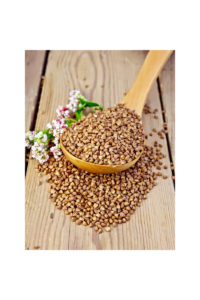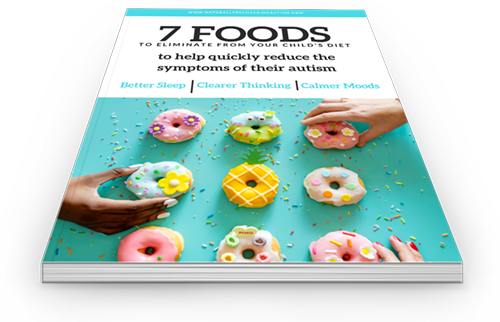One fact remains, people need protein. It does not have to be an excessive amount, and should not be, but we need it. Since the greatest source of protein comes from animal meats, vegetarians need to be sure they are getting enough in their diets. Meats are also an important source of vitamin B12. Children on the autism spectrum are already deficient in this vital nutrient, so supplementing is important. The best form of B12 is Methyl B12 (sublingual). This provides nutrients for optimum functioning of many systems including the brain, nerves and the digestive tract.
For any foods in your diet it is important to eat organically. Pesticides and herbicides can continue to keep your child ill. Their detoxification systems are weakened and cannot dispel additional toxins.
Grains should be limited always, and avoided completely when cleansing the gut and balancing candida. They counter-effect our positive efforts with a clean, gut healing diet. Grains are also known to be detrimental to brain function. Alzheimer’s is now being called the third type of diabetes due to a large number of grains and carbohydrates in our diets.
Renowned neurologist, David Perlmutter, MD wrote his famous book, Grain Brain, which describes in detail, and abundant studies, the detrimental effects of grain on the brain.
Gluten-free, grain-free, vegetarian protein sources:

Amaranth: A perennial plant. It is good for digestion and bone health, and a great source of protein, fiber, manganese, magnesium, phosphorus and iron.
Buckwheat: Not wheat at all, but a seed. Buckwheat is filled with nutrients and antioxidants. It is easily digestible protein, good for your heart and non-allergenic.
Hemp: A seed rich in two essential fatty acids, linoleic acid (omega-6) and alpha-linolenic acid (omega-3), and 25% of their total calories are from high-quality protein.
Quinoa: A seed which is closely related to spinach and beets. It is rich in protein, antioxidants and minerals, but do be cautioned regarding its higher carbohydrate content.
All nuts (except peanuts which are not a nut and contain many molds). Muscle test first for sensitivities. Blanching nuts helps this. Blanching is the process of soaking the nuts in hot water for a minute or two, then quickly cooling them off and rubbing the skins off of them.
Peas are a good source of protein but should be avoided if on a candida cleansing diet. The carbohydrates in this food can feed the candida, so eliminate it from the diet until you are about a month in, then you can try small amounts.
Millet: Millet is also a seed often referred to as a grain. High in vitamins and minerals, but beware of higher starch content when on a candida cleansing diet.
Rice protein is another popular protein source, but again, it should not be used in the initial month of a candida cleansing diet due to the carbohydrate content. After the initial month, it is wise with anything higher in carbohydrates and starches to limit consumption to a minimum.
Some vegetarians eat eggs and dairy. Eggs are an excellent source of protein, along with other vitamins. Muscle test for eggs to be sure the body accepts them. They tend to be an allergen for many.
Grass fed butter is a healthy food. The good fats are important like this one along with others such as coconut oil, and olive oil (cold-pressed, organic).
Cheese is best if it is from goats and sheep. Cows’ milk, even organic, is a high allergen source filled with casein, a protein our bodies have a hard time digesting, and it is highly inflammatory.
Next best would be sprouting. The process of soaking any grain from 12-48 hours kills off that phytic acid. Phytic acid binds the minerals and other nutrients such as enzymes preventing them from being utilized by the body. Sprouting allows all the minerals and vitamins to be free, so you can absorb and digest them.
Additional sources of grain free vegetarian proteins are avocado, spinach, and lentils. Par-steam the spinach for 2-3 minutes to remove the oxalac acid which can cause adverse reactions in many people. Always dump the water out.
In the beginning, (the first 3-4 weeks, or so) of a candida cleansing diet it is best to avoid starches including vegetables and beans with higher carbohydrate content such as yams, potatoes, artichokes, peas, soybeans, garbanzo beans, and chickpeas.
Always avoid the top 5 inflammatory foods:
- Wheat
- Dairy (mostly cow’s)
- Corn
- Soy
- Sugar
Be sure to get your free guide to the 15 best foods to eat and those to avoid.
Free Online Autism Recovery Workshop
Join our Free Autism Recovery Workshop, The 4 Stages to Naturally Recover from the Symptoms of Autism. Stage 1: Healing the gut, Stage 2: Natural heavy metal detoxification, Stage 3: Clearing the co-infections, Stage 4: Brain support and repair. Reserve your online seat here.
Help your child get the optimum results in Karen’s step-by-step online program, The Autism Moms Mentor, working to improve the biological health aspects for better focus and concentration, improved sleep, calmer moods, and a lot more. Already in over 35 countries, this program offers you the natural resources I used to recover my own son. It is unique in that it walks you through not only gut healing and detoxification, but also the co-infections often left out of a recovery program. It also includes additional components such as muscle testing and emotional clearing to empower you to get the best possible outcome with support from a mom who has done it!












This is great info, Karen. Thank you so much!!
You’re very welcome! I’m glad it is helpful.
Karen
Thanks for putting it up Karen. What if someone is allergic to amaranth? Any other alternative?
Thanks
HI Amit,
If there is an allergy to amaranth, then they could try any of the other alternatives here on this page.
What about raw cow milk or cow milk kiefer? From a grass fed source
Hi Jillian,
Yes, raw cow’s milk is much healthier, but if the issue is with casein digestion (the protein in dairy), then it is not alright. Dairy can still also be very inflammatory. Keifer is cultured, so it is often a bit well tolerated, but the same principles apply.
Is home made yoghurt fermented for 24hours suitable?
Yes, 24 hours is the standard time. do beware of die off reactions (see my blog post on die off). You need to start slowly with small amounts.
Good and very informative